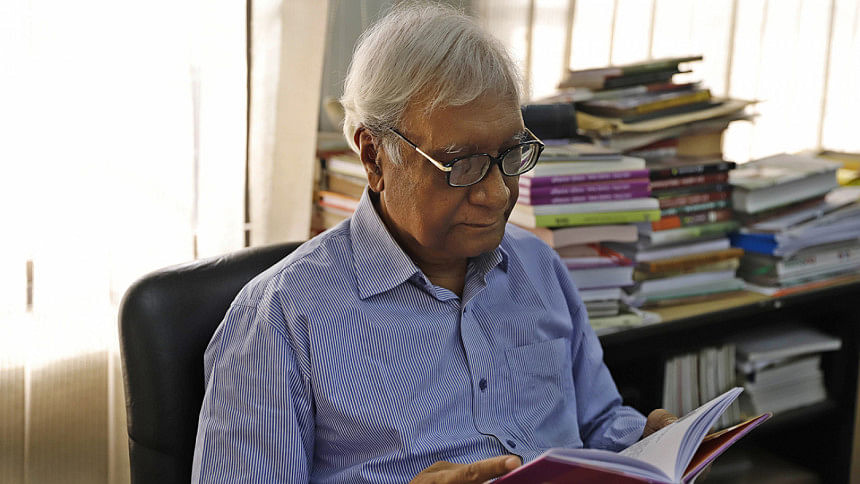Serajul Islam Choudhury: Our leading literary and cultural critic

Life is all about enjoying work," said Serajul Islam Choudhury on his eightieth birthday. Widely acclaimed as our foremost intellectual and as our leading literary and cultural critic, Choudhury exemplifies nothing short of phenomenal productivity. Today—June 23—marks his 83rd birthday. The scale and scope—as well as the challenges—of his work have only increased now, given that he has recently courageously moved in the direction of launching a new forum for socialist intellectuals in Dhaka. True, Choudhury—one of the most productive writers by even international standards—is more than a tireless worker with words. In fact, his work is characterised by an activist and productive intersection of the word and the world. Choudhury continues to remind me of Picasso's famous pronouncement: "Youth has no age."
An author of more than a hundred books and countless articles, Serajul Islam Choudhury characteristically dissolves the borders and boundaries between writing and fighting in a world devastated by different forms and forces of oppression and injustice. It is not for nothing that Kazi Nazrul Islam and Maulana Bhasani continue to remain Choudhury's heroes. Choudhury has also earned his place as a major writer in the Bengali language. Over the years, I wrote about different aspects—different dimensions and directions—of his wide-ranging work. But, admittedly, I am yet to cover many areas of his interventions and inquiries. In this short piece I intend to touch upon only a few of those areas while quickly underlining some, if not all, of his contributions as a writer and as an intellectual.
I think Choudhury's fundamental contributions as a literary critic reside first in the ways in which he has broadened the horizon of our engagement with the literary itself, making the point that our approach to the study of literature cannot but be interdisciplinary, although Choudhury has never consciously used that word; he may find the word even fashionable. In any event, in the context of Choudhury's own work, one may define "interdisciplinarity" as an intellectual and critical practice whereby resources from multiple disciplines or multiple areas of study can be brought together and synthesised in the interest of producing new knowledge.
Serajul Islam Choudhury has offered stimulatingly interdisciplinary—and groundbreaking—readings of almost all major figures in the history of Bangla literature: Ishwar Chandra Vidyasagar, Madhusudan Dutta, Bankimchandra Chatterjee, Rabindranath Tagore, Saratchandra Chatterjee, Jibanananda Das, Kazi Nazrul Islam, Jasimuddin, among many others. One may cite numerous examples of Choudhury's critical works; but his relatively recent interventions called Nazrulke Chinte Chaoa (2014) and Rabindranath Keno Joruri (2016) are compelling cases in point. These are the works in which aesthetic, social, historical, political, cultural, and ideological contours and coordinates of lived human practices are yoked together in order to illuminate not only the literary as such but also the path to human emancipation itself. And the question of human emancipation, one must add, constitutes Choudhury's fundamental and overarching theme with which he has remained consistently concerned in the Marxist tradition. True, one hallmark of Choudhury's literary criticism is his emancipatory consciousness, which enables him to politicise the aesthetic, not the other way around.
Indeed, with the publication of his seminal work Bangla Goddyer Samajik Byakaron, Serajul Islam Choudhury already almost singlehandedly inaugurated a school of criticism that is socially conscious, politically engaged, ideologically demystifying—the kind of criticism that also makes the point that erasing class is a matter of class politics itself. For him literature is, among other things, simultaneously a site of class struggle and a site of the production of liberatory consciousness. His readings of Bankim and Sarat in particular—among others—amply attest to that very attitude to literature he tends to demonstrate.
Further, in his work called Sreni Somoy Shahittyo (1986), Choudhury ably zeroes in on areas as diverse as Aristotle and his politics, the culture of capitalism, the relevance of Rabindranath Tagore and the pitfalls of idealism, Nazrul Islam and his revolutionary consciousness, Noam Chomsky and the question of liberation, and the challenges of Shakespeare, and thereby demonstrates with force and fervour his interest in class politics and revolutionary politics that variously informs and inflects Choudhury's critical formulations. In fact, Choudhury's role as a critic and his role as a revolutionary intellectual intersect in the site of literary criticism.
Serajul Islam Choudhury also pioneered what one may call oppositional literary criticism—the kind of criticism that challenges the literary Establishment itself for its blind spots as well as even the canonical figures that others uncritically celebrate, idealise, even idolise. It was Choudhury who first mounted sustained ideology-critiques of Bankim and Sarat, while not letting even Rabindranath off the hook in a number of instances, without, however, undermining their great contributions and accomplishments.
Choudhury's critiques, of course, range beyond Bangla literature. He also critically engages with an entire constellation of figures in world literature with a particular focus on English literature itself, one of the major areas of his work. His book Ingreji Shahittyer Koekti Dik (2016)—among many others—serves as an example here. But Choudhury does not question for the sake of questioning. Rather he raises questions—from the standpoint of human liberation—in order to challenge the existing system while seeking the path to changing it. Indeed, he is the most powerfully combative literary critic writing in Bangladesh today.
Choudhury's literary criticism eventually morphs into cultural criticism. He is surely a first-rate cultural critic, one who shows how culture is much broader than literature itself, and how culture turns out to be even a charged terrain of contestation, antagonisms, or even power. For him culture is thus much more than poetry and paintings and music and the arts; for him culture then comes to encompass the totality of lived human practices. His rather epical journey as a writer—from at least his Onotikranto Britto (1977) to his current interventionist undertakings—evinces his profound concerns with the question of culture at numerous levels. To put it bluntly, Choudhury's contributions as a cultural critic decisively lie in politicising culture itself. In other words, he makes it clear that culture itself is more political than it appears.
Take one of Choudhury's latest works, Pa Rakhi Kothay (2018), as an example. In this work—which carries some of his earlier pieces as well—Choudhury dwells on a range of issues relating to the pitfalls of our education system, the underside of developmentalist rhetoric and claptrap, the relationship between class and culture, the problems of remaining indifferent to politics, even the question of modernity, and the cultural significance of the October Revolution of 1917 (one of Choudhury's favourite topics), in order to suggest how critical it is to pay attention to the question of culture itself in the very interest of political and social change.
For instance, not only politico-economically but also culturally, Choudhury continues to show how capital's tyranny and barbarism are pervasive worldwide—how they end up uprooting people from their own roots, their own land—while also calling attention to capitalism's own internal contradictions and crises. Indeed, culture, politics, and political economy all productively interpenetrate in much of Choudhury's work, making it clear that Choudhury is even more than a cultural critic; that he is, above all, an intellectual, hellbent as he is on making connections among otherwise disparate and discreet phenomena and practices in order to render systemic oppressions visible in the interest of nothing short of a social revolution.
Not much has been written about Serajul Islam Choudhury's role as a sociologist of the everyday—a role that began much early on in his life with the nationally popular weekly column called "Somoy Bahiya Jaaye" that he wrote for years on end. That role continues today. As the Greek poet Odysseas Elytis said once, "You'll come to learn a great deal if you study the insignificant in depth." Choudhury continues to zoom in on apparently insignificant, otherwise ignored details in our daily social life, while focusing on marginalised peoples and their problems and concerns, as can be seen not only in his essays but also in numerous editorials he has written for his magazine called Notun Diganta. For him, of course, details eventually amount to patterns—ones that he renders visible in the interest of a radical reconstitution of our society and our world. Again, in all this, Choudhury's role as a sociologist of the everyday can by no means be separated from his role as an intellectual.
On a relatively personal note, I cannot but say with pride that this leading intellectual was my direct teacher in the English Department of Dhaka University, and that I continue to work with him closely on more levels than one. Indeed, I always derive energy and inspiration from his work and wisdom, as I also continue to enjoy his loud laughter, his humour, his jokes, his stories. On the 83rd birthday of Serajul Islam Choudhury today, I wish him even a more productive life full of love and light and laughter.
Azfar Hussain is Vice President of US-based Global Center for Advanced Studies and Associate Professor of Liberal Studies/Interdisciplinary Studies at Grand Valley State University in Michigan. He is currently Summer Distinguished Professor of English and Humanities at the University of Liberal Arts-Bangladesh (ULAB).

 For all latest news, follow The Daily Star's Google News channel.
For all latest news, follow The Daily Star's Google News channel. 



Comments